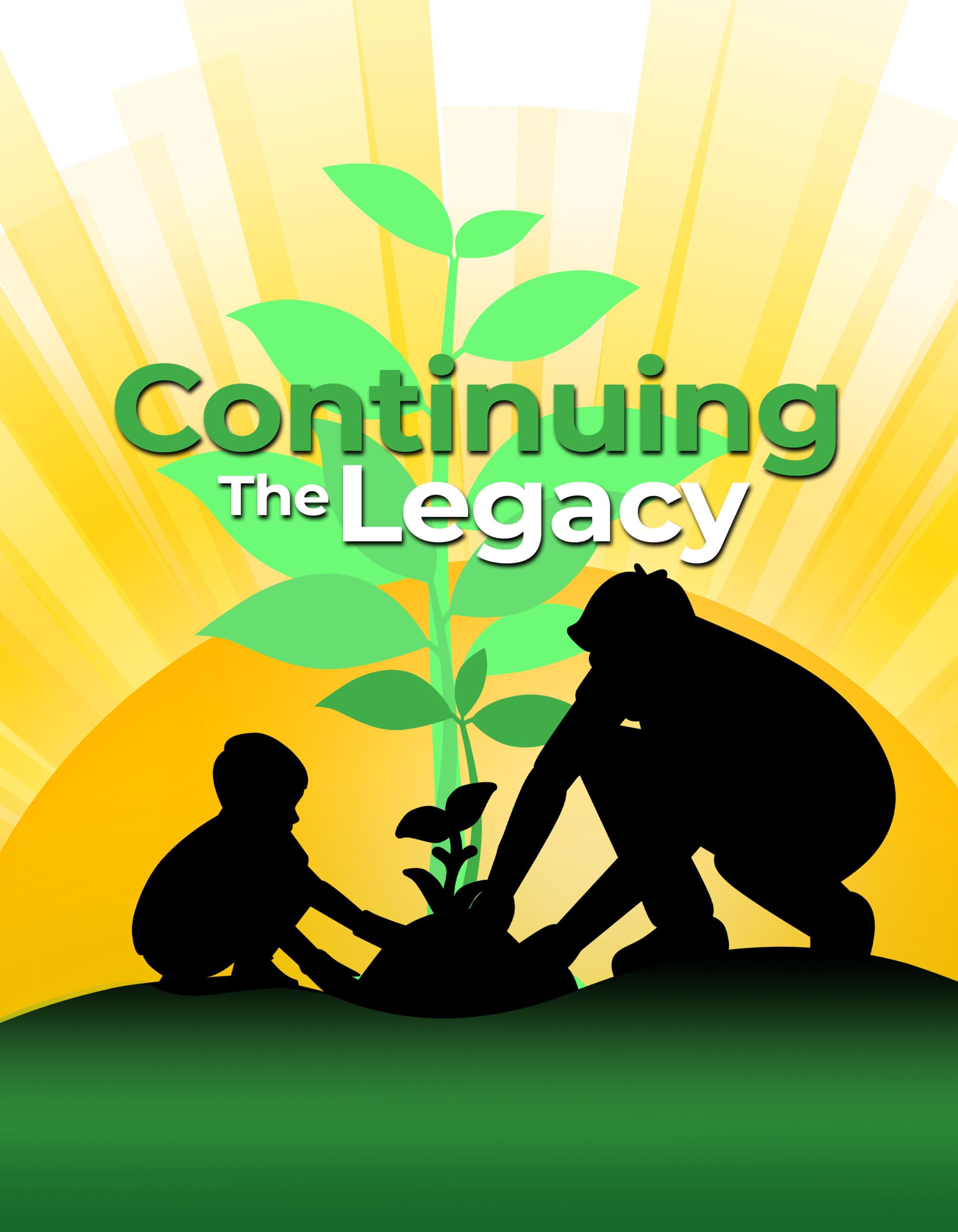
With frequent mergers and acquisitions occurring in the industry, it can seem like this is the only viable exit strategy for owners who don’t want to close their doors. However, there are still plenty of lawn and landscape businesses that have been passed on to the next generation. In each of these cases, these second-generation owners grew up working in the family business but had no plans to eventually become the organization’s leader.
The Journey to Ownership
Chris Ahlum, president of Ahlum & Arbor Tree Preservation, based in Columbus, Ohio, took over his father’s company in August 2017. He spent every summer in middle school and high school working on crews. At the time, he wanted to get away from the business and pursue a career in aeronautical and mechanical engineering. After two years, he transferred to landscape horticulture.
“I had a long-time client put his arm around me and ask me, ‘Son, do you know what you have here?’” Ahlum says. “That was a turning point for me. I love being outside but never really thought about actually going into the business. My dad, if anything, pushed me away from it and did not try to get me to come into it.”
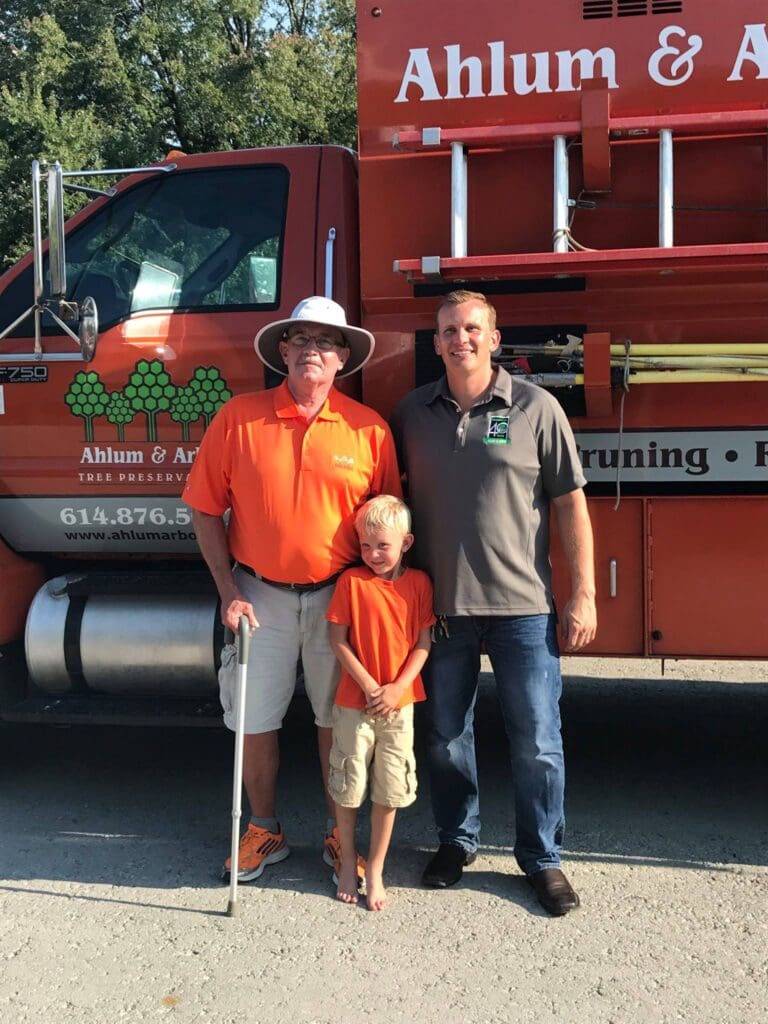
Photo: Ahlum & Arbor Tree Preservation
It was February 2017 when his father was diagnosed with progressive supranuclear palsy (PSP), a rare neurological disorder that causes dementia. They planned for Ahlum to step up and run the day-to-day operations while his father still owned the company.
“In six months, we went from that to me owning the business,” Ahlum says. “It was a whirlwind for those six months and first year. We did not have a transition plan or really discussed much about it. At the initial time, I was 25% power and my father 75%.”
In a similar situation, Peter Pazmany, president of Pazmany Bros. Landscaping, based in Los Altos, California, worked for his father’s company on a part-time basis when he was in high school and college but never saw himself becoming an owner.
Days before his college graduation, his uncle, who was one of the business partners, passed away, and his father became the sole owner. Pazmany’s father asked him if he wanted to help him run the business for a short period to give their clients time to find a new provider and their employees time to find new jobs.
As he started working in the field, Pazmany started seeing a lot of opportunities as clients would ask them to do all kinds of jobs.
“Then I thought, ‘Okay, maybe shutting it down isn’t what we need to do,’” Pazmany says. “Maybe I could really use my experience in the business, plus education, plus just quick communication and give people what they want.”
Pazmany has been running the business with his father for 18 years now. Dean DeSantis, owner of DeSantis Landscapes, based in Salem, Oregon, has also owned his company for 18 years. He spent his summers helping out, but when he graduated from the University of Oregon with a business degree, he had zero interest in the family business.
“I was working for the training provider for the AmeriCorps program and was traveling a lot putting on conferences and workshops around the country,” DeSantis says. “My twins were born around this time and the frequent travel wasn’t ideal for a young father, and it definitely wasn’t ideal for a young mother. One Father’s Day, my dad started talking to me about his struggles to figure out a succession plan with the business, and so it began.”
Adam Frederico, owner of Frederico Outdoor Living, based in Lehi, Utah, says he worked one summer for his father’s company before going on to pursue a career as a consultant in Chicago. His dad was retiring, and Frederico wanted to try his hand at running a small business.
“The timing just worked out where he said, ‘Well, I’m trying to do something with this business,’ because he was done with it,” Frederico says. “It was just a new idea, and we were both shocked that there was possible alignment.”
Frederico has now owned the company for three and a half years.
Transitioning Into the Ownership Role
Depending on the situation, some of the second-gen owners had time to plan and discuss the transition, while others leaped into the new role with little preparation. However, they all faced various challenges during this period.
DeSantis says the transition for him wasn’t easy.
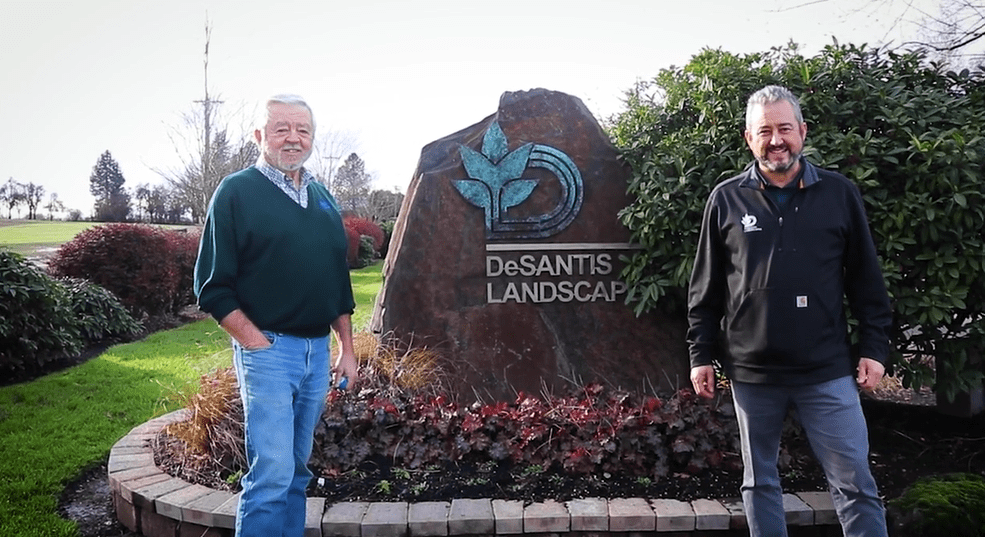
Photo: DeSantis Landscapes
“I had experiences working in larger organizations and an education that provided me with some business skills, so I had ideas and plans to move the organization forward but, like any new leader, trying to implement new systems, processes and culture, it can sometimes be a slow grind,” DeSantis says.
In one instance, DeSantis struggled with a key employee who had been with the company for over 20 years. This manager was inappropriate in meetings and unprofessional in general. DeSantis talked to his father about how it was impacting their culture and eventually, he terminated the employee.
“I was the most despised person in that organization for quite some time,” DeSantis says. “It clearly sent a message though of who we were going to be and what we would and would not tolerate. It was a clear turning point.”
Frederico faced a similar situation where the hardest part was getting the team aligned and bought into his vision for the company.
“In the beginning, it was very tumultuous,” Frederico says. “In fact, it was pretty much a whole new team within the first three months. We had to just completely hire all new staff because it was important to stick to our core values and get people that were aligned on the vision.”
Pazmany says you just have to let go of the employees who refuse to row the boat in the same direction, as they will make it harder for everyone else.
Frederico says professionally, his master’s degree in business helped him gain a lot of confidence.
“My last job before buying the business was another consulting firm where we helped small growing businesses with their accounting and finance needs,” Frederico says. “I felt like that was the final piece to help give me the confidence that I could manage the day-to-day.”
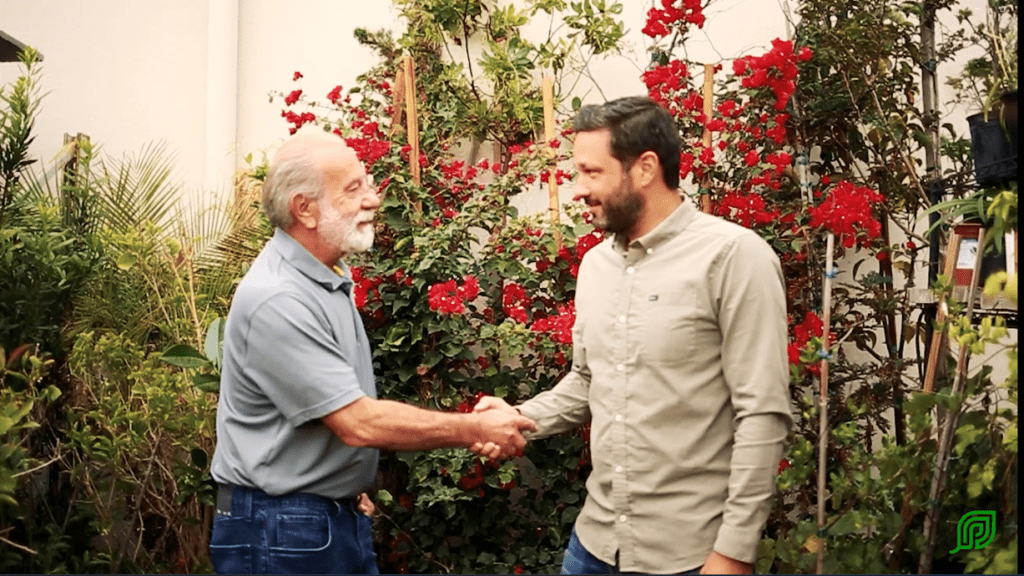
Photo: Pazmany Bros. Landscaping
Frederico admits that he wasn’t as prepared to handle other aspects like sales, marketing and recruiting. Pazmany says the hardest part for him was trying to learn everything he didn’t know.
“You think you know it, but then you don’t know it,” Pazmany says. “You haven’t had a chance to really recognize the patterns and cycles, which I think is so important for people.”
He says he had to try to figure out what direction they wanted the business to go in 2007 when the economy wasn’t in great shape. Pazmany says he learned a lot from peer groups and Tony Bass.
“Whether you’re reading magazines, or you’re reading online, or you’re going to trade shows or you meet a mentor, these are all things that can shave months and years off the learning curve,” Pazmany says. “A lot of times, people don’t know where to start, and so they don’t do anything. They’re so busy with the day-to-day, minute-to-minute. If you want, you could work 12 hours a day just going in circles, from answering phones, scheduling, going out in the field. At first, feeling busy is really good, but then at a certain point, you have to delegate and change the way you do things; otherwise, you’ll never be able to hit that next level.”
Ahlum says the hardest part of his transition was knowing his father had only two to eight years and was slowly declining while he had to keep the business afloat.
“From a business perspective, going from working with people to being their boss is always a challenge,” Ahlum says. “Everyone wants to be your friend. I think that’s a big struggle for anyone that goes from field to management or being the owner.”
Earning the Team’s Respect
Earning the respect of the team is one of the most crucial aspects of passing the business on to the next generation.
Ahlum says he previously tried to be nice and everyone’s friend, but being direct and candid is far better.
“You have to be a real person and honest with the team,” Ahlum says. “I think I’m pretty open when it comes to discussions with management and employees on where they stand, my thoughts, or where we are as a company.”
Pazmany says he was naïve at first, thinking he could come into the company and point out the inefficiencies and people would be appreciative and make the changes.
“The reality was, sometimes people don’t like to change, they don’t welcome change,” Pazmany says.
“Initially, out of our five people, we got down to two people, and at that time, it seemed like possibly closing it down might be a good idea.”
Pazmany says he learned there was always a reason why your team has been doing it one way, and it is important to listen and genuinely care.
“If you’ve come in, and you just start ruling with an iron fist and don’t listen to anybody, you’re not going to get any buy in.,” Pazmany says. “It’s going to make it really difficult. If you at least understand the situation you walk into, get feedback, try and explain your goals and you really do care, a lot of people will get on board.”
Depending on the size of the company, you should probably have some level of experience working in the field. For those taking on a smaller company where you know all the employees, this is more critical as you may not understand how to properly estimate a job.
“There’s so much you learn from being in the field,” Pazmany says. “For my salespeople, personally, I have them manage smaller projects when they start and it really has helped them understand the process in the field, and how long things take and they have the job cost, and they have to go over numbers and it helps them become better estimators.”
Frederico says earning the team’s respect was a challenge in the beginning.
“Even though my role today is much more focused on the future and in recruiting and sales, I still try to carve out time every week to visit the job sites, check in with the team and lay out plants and get my hands dirty,” Frederico says. “I do think that’s always going to be important for the field teams to see the leadership team be that involved.”
DeSantis agrees you have to earn respect by leading by example.
“It’s being willing to show up and engage with an issue, with the team, and to be willing to make the hard decisions,” DeSantis says.
DeSantis adds that trusting employees to do what they do best and not micromanaging earns respect by showing you trust their talents to work toward a larger vision.
Lessons Learned
Frederico says he tries not to have regrets; rather, he sees them as learning experiences. He does think he made some changes too fast. Frederico says he wishes he had his dad stay on longer than three months to continue fostering relationships with vendors and customers.
“The speed of change, I think, caused more chaos than necessary, and some stuff maybe could have waited, whether it was six months down the road or a year down the road,” Frederico says.
One thing Pazmany would do differently is not procrastinate. He put off creating a formal business plan for too long thinking he was too small or too busy to fool with one.
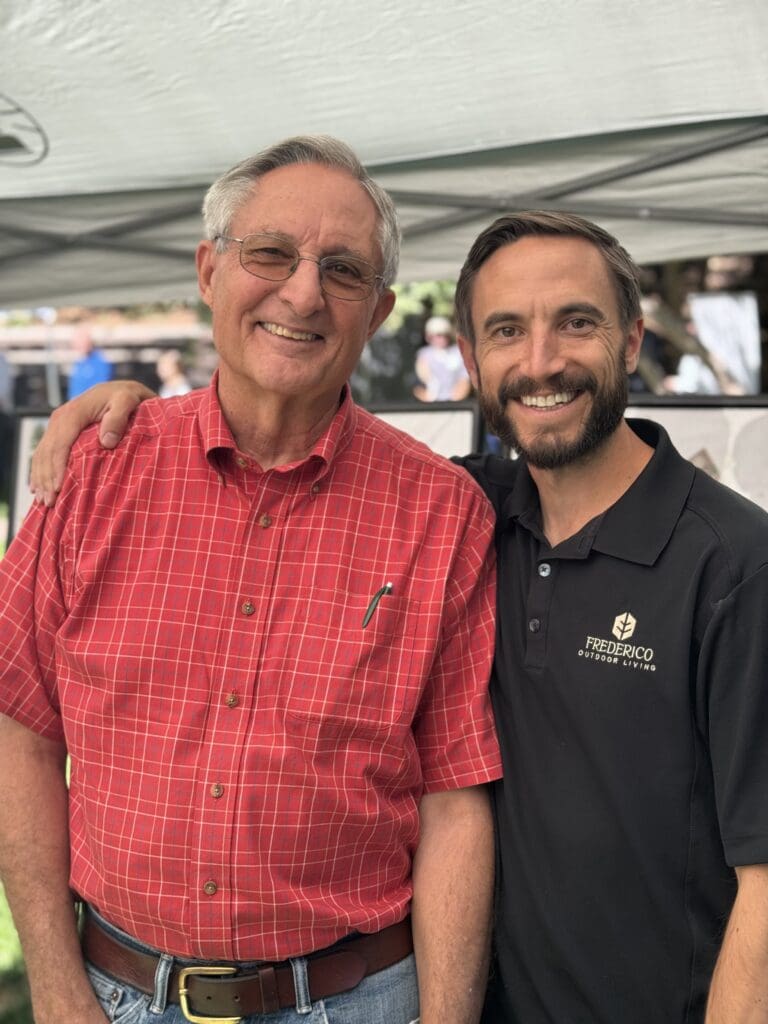
Photo: Frederico Outdoor Living
“If you wait too long to get the perfect plan by the time you put it together, it will have already changed,” Pazmany says. “I wish I would have put business plans and goals and budgets more formally in place when I started. I think that would have helped me understand numbers even better.”
Pazmany says his father’s airplane view has helped provide guidance and if he’s heading down a path, his father will ask more questions to make him really think about it. Pazmany says his father also helped him understand at a certain point he couldn’t keep wearing all the different hats.
“You have to bring other people in,” Pazmany says. “You have to get other people involved that can help you do and execute your goals.”
Ahlum says they will succeed as a team and building a great team around him has helped him grow the company.
“I’ve realized over the years it’s not what I can do but what our team can do,” Ahlum says. “The biggest thing sometimes is for me to get out of their way.”
DeSantis says his father fully retired when he took over the business, but he’s always been available when he needed to consult him.
“Many of my second-gen peers struggle with the founder (usually dad) always looking over their shoulder, sticking their nose in and second-guessing decisions,” DeSantis says. “I’ve been very fortunate; my dad has been more of an advisor who provides his opinions when asked and not on his own whims.”
Ahlum says he believed he was ready when he took over the business, but in reality, he had to learn the business side better as he went.
“Before transitioning, I used to tell my dad to just retire,” Ahlum says. “We had arguments and heated discussions about things before he got sick. I thought I knew it all, being young. I wish I could redo those years. This event changed my whole perspective on life. He worked 24/7 and built a great business, but I wish he enjoyed life more. I want to be successful and my company successful, but also I’ve focused more on spending time with my family.”
Evolving the Company
With new leadership comes inevitable change and the conversations tied to them.
For Frederico, he decided to move away from maintenance work and rebrand the company. His father was surprised when they had this discussion. Frederico says his dad’s main goals were focused on quality and brand reputation.
“I don’t think he ever desired to make it the biggest company or the most employees or anything like that,” Frederico says. “He just wanted to create a great product and have a great team, so we’re definitely continuing those.”
In addition to maintaining these goals, Frederico wants to be the first name in luxury landscaping in Utah and open additional branches in other growing markets in Utah.
Ahlum says they have gone from 20 employees and $1 million in revenue to over 60 employees and $7 million in revenue. He says they’ve had to change processes and procedures as they’ve grown. Because Ahlum’s father passed away in September 2022, they didn’t have a lot of conversations about these changes.
“My dad said if it wasn’t for your mom, it would be me and four other guys,” Ahlum says. “I hope to be a regional company in the Midwest with six to eight branches but focus still on our customer service and quality.”
Pazmany says they’ve changed some of their service offerings as they’ve grown and this has called for conversations with some of their long-time clients. Pazmany says originally, they thought they could keep these customers happy and customize to meet everyone’s goals and demands, but eventually, they had to part ways with some clients that didn’t make financial sense for them.
“To get to our first million in sales, we said yes to so many people,” Pazmany says. “But then to get to our second million and third million, we have to learn when to say no.”
This article was published in the Sept/Oct issue of the magazine. To read more stories from The Edge magazine, click here to subscribe to the digital edition.

